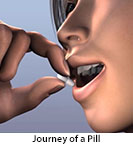
Corticosteroids
________________________________________________________________________
KEY POINTS
- Corticosteroids, also called steroids, are medicines used to treat symptoms caused by inflammation, such as swelling and irritation.
- Make sure you know how and when your child needs to take the medicine. Your child should not take more or less than he or she is supposed to take. Your child should not stop taking a steroid without your provider's approval. You may have to lower your child’s dosage slowly before stopping it.
- Ask your healthcare provider or pharmacist what side effects the medicine may cause, and what you should do if your child has side effects.
________________________________________________________________________
What are corticosteroids used for?
Corticosteroids, also called steroids, are medicines used to treat symptoms caused by inflammation, such as swelling and irritation. Some conditions caused by inflammation include:
- Asthma and other lung diseases
- Hay fever
- Juvenile idiopathic arthritis
- Leukemia
- Psoriasis
- Eczema and other allergic conditions
If your child has an organ transplant, such as a kidney or heart, he may take steroids to keep his body from rejecting the transplanted organ.
Steroids may be used for only a few days, or they may be used for several months or years.
Your child should not stop taking a steroid without your provider's approval. You may have to lower your child’s dosage slowly before stopping it to prevent side effects.
How do they work?
Corticosteroids block the chemicals that the body makes that cause swelling and irritation. In some doses, they can change the way the immune system works.
You don’t need a prescription to buy mild forms of the medicine, such as skin cream with a low amount (1%) of hydrocortisone. However, you need a prescription from your child’s healthcare provider for most steroids.
What else do I need to know about this medicine?
- Follow the directions that come with your child’s medicine, including information about food. Make sure you know how and when your child needs to take the medicine. Your child should not take more or less than he or she is supposed to take.
- Many medicines have side effects. A side effect is a symptom or problem that is caused by the medicine. Ask your healthcare provider or pharmacist what side effects the medicine may cause, and what you should do if your child has side effects.
- Try to get all of your child’s prescriptions filled at the same place. Your pharmacist can help make sure that all of your child’s medicines are safe to take together.
- Keep a list of your child’s medicines with you. List all of the prescription medicines, nonprescription medicines, supplements, natural remedies, and vitamins that your child takes. Tell all healthcare providers who treat your child about all of the products your child takes.
If you have any questions, ask your healthcare provider or pharmacist for more information. Keep all appointments for provider visits or tests.
Last modified: 2016-10-28
Last reviewed: 2018-01-17


